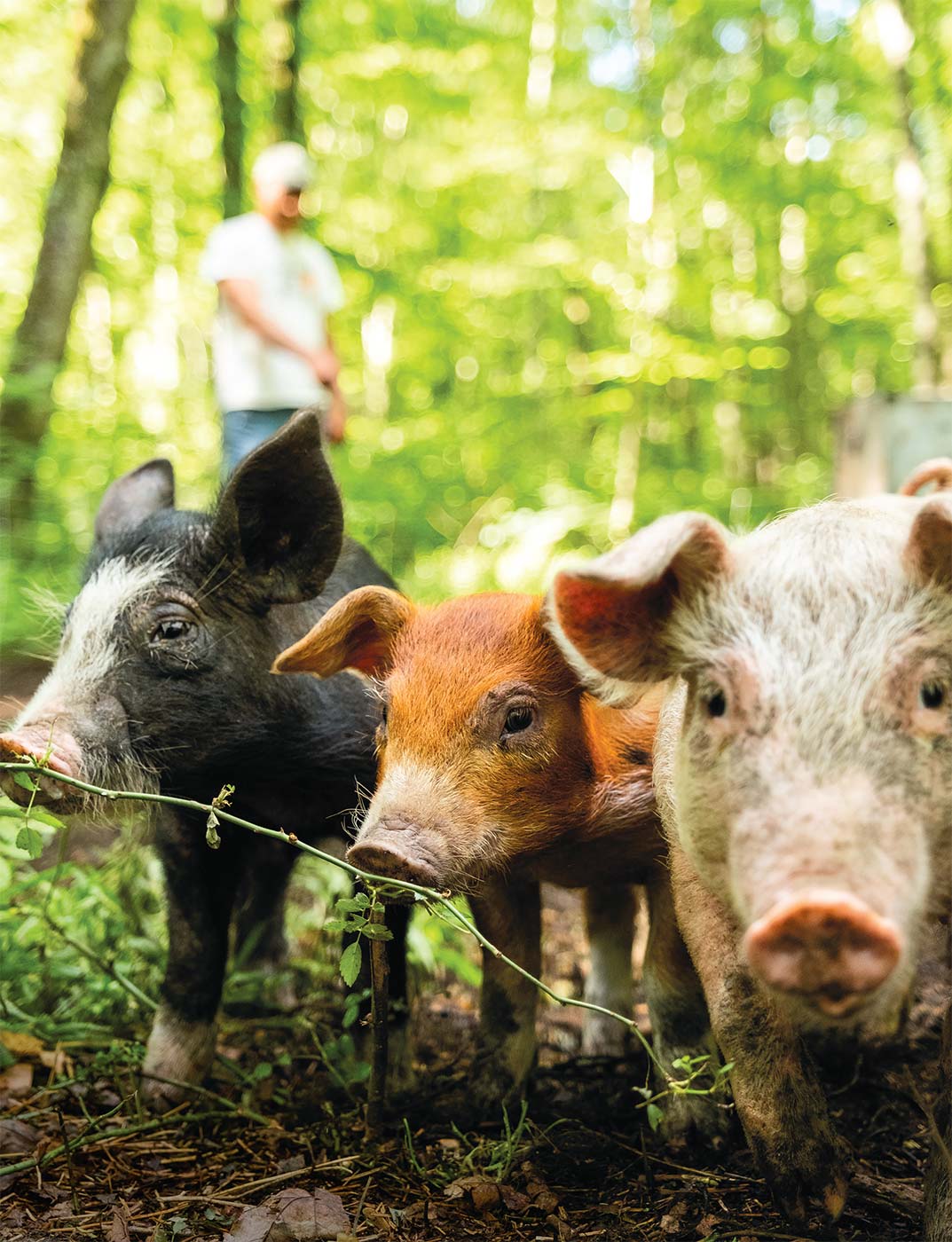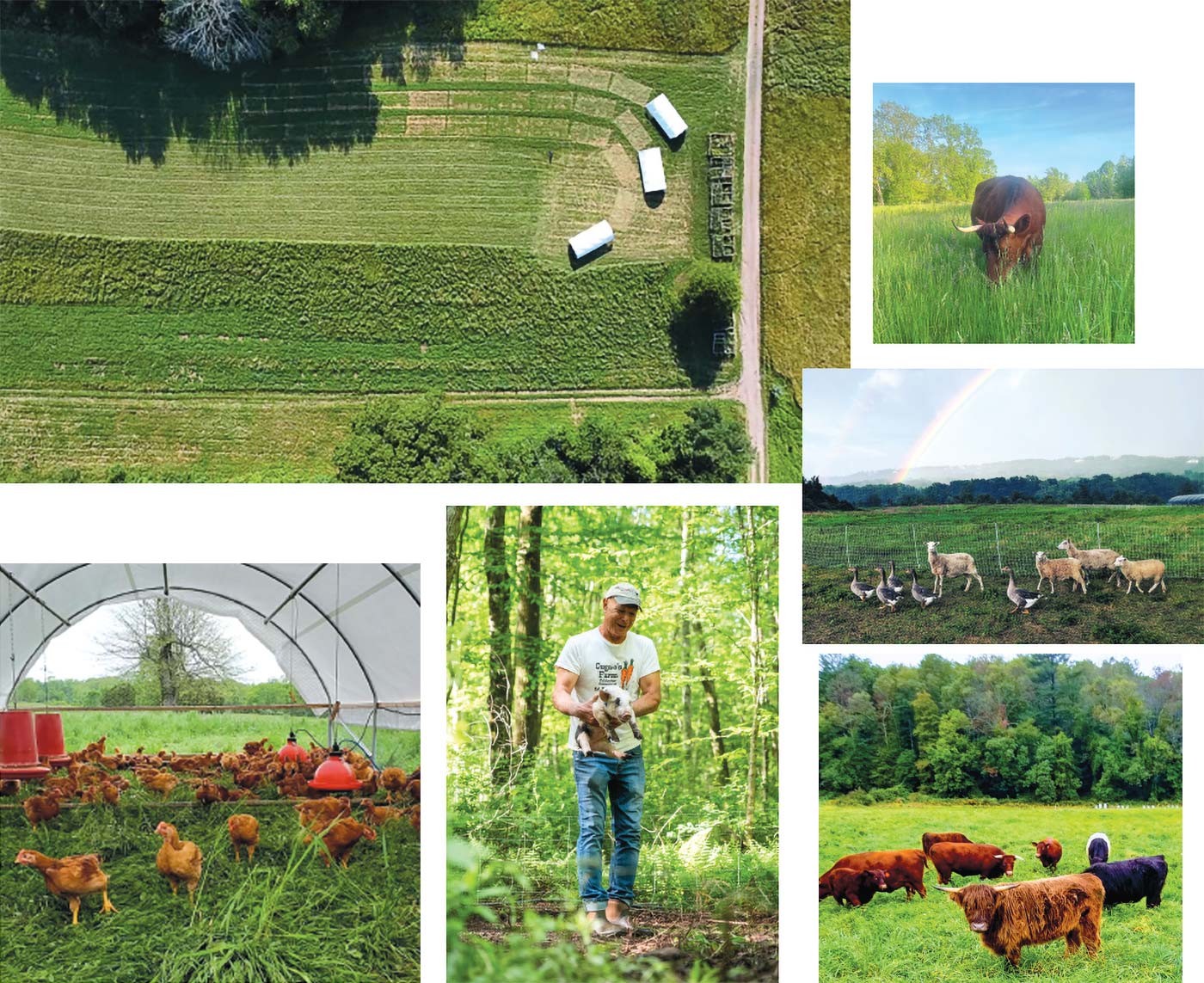A Verdant View of Pasture Raised Poultry and Livestock in Connecticut

Darren Cugno, owner & Operator of Cugno's Farm, with a few of his prized forest-raised pigs. PHOTOS LING MESSER FOR CUGNO’S FARM; KIRSTEN MARRA FOR MUDDY ROOTS FARM; HANNAH TRIPP FOR PROVIDER FARM; RODGER PHILLIPS FOR SUB EDGE FARM
Rustling can be heard in the forest as we travel down the well-trodden path. As we get closer, a parade of piglets scampers out from amongst the trees. They squeal with their tiny, curly tails wagging back and forth as they run towards Darren Cugno, their farmer and caregiver. “Hey you pigs!” he calls out playfully. They climb around and bump into one another as they enthusiastically eat the food Darren spreads on the ground.
Darren is the owner and operator of Cugno’s Farm, a 76-acre diversified farm located in Colchester, Connecticut. He pasture-raises chickens, forest-raises pigs, cultivates hemp, forages mushrooms, and grows USDA Certified Organic fruits and vegetables. His farm was formerly owned by the late Horst Slembek, a local farmer and mason, and Darren has been farming there for over a decade.
“I’ve been interested in farming my whole life. It was my childhood dream to become a farmer,” Darren states. “I think it’s something in my genetic makeup. My great-grandparents came here from Italy, and they led an agrarian lifestyle. The farming lifestyle skipped a few generations and then took hold again with me. When I tell people I’m living the dream, I mean it. It’s what I always wanted to do.”
Each year, Darren forest-raises 20-30 pigs that spend their days foraging, rooting, breathing clean air, and drinking fresh water. Pigs and poultry are non-ruminant animals, so their digestive systems do not enable them to survive on grass alone. Darren feeds his pigs a diet of leftover organic vegetables, whey from Cato Corner Farm, brewers’ grain from Hop Culture Brewery, and non-GMO feed. “The health of the animal is paramount,” Darren asserts. “An animal is not designed to be inside all the time. Nature takes care of itself.” The life the animals on Darren’s farm live is vastly different from what most farm animals in the United States experience.
According to the United States Department of Agriculture (USDA), 10 billion animals are slaughtered each year in the United States. 99% of these animals are raised in confined animal feeding operations (CAFOs), also known as factory farms. On a factory farm, animals do not live in conditions that most people would consider an actual farm. Animal welfare is poor, and animals are typically forced to live indoors. Many never see the light of day, nor do they have access to fresh air, sunshine, or pasture. They are often raised in cages, have their tails cut off, and are fed antibiotics to prevent them from getting ill due to these unnatural conditions.
The idea of animals living such unnatural lives just didn’t jive with Rodger Phillips, co-owner of Sub Edge Farm in Farmington and Avon, Connecticut. In the early 2000’s, well before he started Sub Edge Farm, he was listening to an interview with Michael Pollan about cattle that sparked his interest in grass-fed beef. Pollan discussed how cattle, which are ruminant animals that have a “rumen” in their digestive system, can thrive on a grass-fed diet. However, factory farms unnaturally feed cattle copious amounts of grain that often causes them to get sick, so the animals are fed antibiotics preemptively. Why not just raise animals on pasture?
Rodger and his wife Isabelle were not working in agriculture yet but were eager to learn. They found a local farm called Urban Oaks Organic Farm in New Britain, Connecticut which was doing amazing work growing crops in the city in greenhouses in soil-based systems. Rodger asked for a job and worked with the owners, Mike and Tony. While he was working there, Rodger and Isabelle became increasingly interested in homesteading – canning, baking, working in the soil, and raising animals.
Eventually, an opportunity arose for Rodger and Isabelle to lease the land from Avon and Farmington, Connecticut which would soon become Sub Edge Farm. 300-acres provided plenty of room to pasture-raise livestock and grow USDA Certified Organic vegetables. It was a great opportunity for them to live and work together as a family and it was everything they wanted.
“An animal is not designed to be inside all the time.
Nature takes care of itself.”

Views of Muddy Roots Farm, Provider Farm cattle, Sub Edge Farm, Cugno's, & poultry at Muddy Roots; Pasture raised cattle enjoying the food at Sub Edge Farm
One of the first things Rodger and Isabelle started was raising grass-fed cattle to complement their vegetable production. “We thought from the beginning that having cattle would be good. We started small with five cows that we bought from Tom Truelove. Then, we started a breeding program,” Rodger explains. The cattle include Scottish Highland and Belted Galloways. The cattle spend the majority of the year eating fresh grass on the Sub Edge Farm fields and eat USDA Certified Organic hay during the winter months – an entirely grass-fed diet. The Sub Edge Farm herd is now around 50 cattle with 10 calves on the way.
Rodger and Isabelle also forest-raise pigs and pasture-raise poultry seasonally during the warmer months. The diet of the pigs and poultry is supplemented with USDA Certified Organic feed from Hudson, New York. They have worked with local butcher Howard Shafer to create a variety of sausages which have been wildly popular. Their pasture-raised turkeys are also sought after during the holiday season.
“We started keeping a few chickens. Then, we had people lining up on Saturdays just for our eggs. We had to expand our egg production. The most we’ve had is around 2,000-layer hens. This year, we had 1,000,” Rodger states. They raise chickens for meat, too. The variety they raise is known as the Freedom Ranger which are very good foragers so a large portion of the diet comes from the pasture itself: grass, clover, weeds, bugs, grubs, beetles, and whatever else they can find. Pasture-raised animals tend to be lean and taste great.
Pasture-raised animals are also healthier to consume than factoryfarmed animals. US Department of Agriculture and Pennsylvania State University researchers found that the eggs of hens raised on pasture contain higher concentrations of vitamins E and A, and omega-3 fatty acids than eggs of caged hens. In a special issue focused on Meat in the Diet: Differentiating Benefits and Risks of Different Types of Meat in the academic journal Foods, researchers found that when compared to factory farmed beef, “consumers would receive more of the beneficial fatty acids for human health (especially the essential omega-3, alpha-linolenic acid) from pasture-fed beef.”
Providing healthy food for the community is also at the heart of Provider Farm in Salem Connecticut’s mission. Provider Farm is owned and operated by Hannah Tripp who grew up in Salem in a household that valued healthy and organic food. She had an interest in food and farming from an early age and decided to spend her first summer home from college volunteering at Provider Farm. Hannah fell in love with farming.
She started as a volunteer and helped with basic tasks like weeding and harvesting. She returned each summer and gained more experience and responsibilities. When she graduated in 2015, she was brought on as a full-time assistant manager where she had larger tasks like irrigation, operating the tractor, and managing the crew. At the end of 2020, the former owners decided to pursue new opportunities. Hannah fortunately had a lot of experience and the skills necessary to jump in and run the business.
The farm is comprised of 15 acres used for sustainably grown vegetables which provide food to a 150-member community supported agriculture (CSA) program and 11 additional acres of pasture for a herd of five to ten grass-fed cattle depending on the year. Hannah leases four parcels of land from four different landlords. Three leases are for cropland only, and the fourth lease houses all the critical infrastructure, storage, the CSA distribution site, and pastureland. The fourth lease has a stipulation that cattle be part of the farming system. The cattle play a key role in land management and reduce the need for off-farm inputs such as fertilizer. Hannah practices intensive rotational grazing where the cattle are moved to new areas of pasture each day. Over time, this has led to significant improvement to the pastures. It also increases soil organic matter, producing rich topsoil. “Eating meat doesn’t need to have a negative impact on the environment,” Hannah states. “Due to the labor involved, it might be a more expensive product which is not necessarily a bad thing. Eating meat sustainably can mean eating less meat that is much higher quality.”
When it is time for an animal to be slaughtered, there are only a handful of licensed slaughterhouses in Connecticut a farmer can take their poultry and livestock to. These local slaughterhouses can have long wait-times. Farmers may need to book a year or more in advance which can pose a challenge for small-scale farms. Farmers are required to plan far ahead, sometimes before they have even raised the animals for that season.
At Muddy Roots Farm in Wallingford, Connecticut, Kirsten Marra and her husband Chris Wellington have taken steps to become one of only two Connecticut Department of Agriculture Licensed Poultry Slaughterhouses in the state. The couple pasture-raise chickens, forest-raise pigs, and sustainably grow vegetables.
Kirsten became interested in agriculture during college while visiting her aunt in Vermont where she found a great community of homesteaders who like to barter and enjoy high-quality food. When Kirsten and Chris bought their home in 2012, it came with a 30’x50’ garden which provided ample space for the couple to experiment with growing all types of vegetables. They also raised chickens for eggs.
Kirsten and Chris now farm on Kirsten’s family’s National Bicentennial Farm in Wallingford, Connecticut. The farm has been farmed in the same family for over two centuries, since the mid-1700s. Kirsten and Chris lease from their family members and devote around a half an acre to vegetable production, seven acres for animal production, and have two high tunnels with two more in the works.
Raising animals was always part of Kirsten and Chris’ plan and the animal welfare aspect is very important to them. “Animals are living beings, and they deserve the best circumstances they can get,” Kisten states. They take great care in raising the chickens and move them every day to fresh pasture. Their commitment is valued by their loyal customers.
“Demand skyrocketed and Chris and I decided – let’s do this,” Kirsten shares, referring to undertaking massive renovations to become a Connecticut Department of Agriculture Licensed Poultry Slaughterhouse. A Connecticut Farm Transition Grant enabled the couple to cost share the renovation of the farm’s old milking room. They rebuilt everything from the ground up so it would meet their requirements and provide a sanitary environment with a refrigeration unit.
These critical steps have enabled Kirsten and Chris to scale their poultry production and opened many doors. With the license, they can raise up to 20,000 chickens per year. They are currently selling a little over 1,300 per year and have plenty of room for continued growth.
Although Kirsten’s family farm has existed for over 200 years, small family-owned farms have been disappearing around the United States. Between the two most recent USDA Censuses – 2017 and 2022 – Connecticut lost over 400 farms. Over the same timeperiod, the number of farms in the United States declined 7% from 2.04 to 1.89 million.
A very small number of companies dominate the US meat industry and have caused many small-scale farms to go out of business. Four companies – Tyson, Perdue, Sanderson Farms, and Pilgrim’s Pride – control 54% of the US poultry industry. Four companies – Tyson, Seaboard Foods, JBS, and Smithfield Foods – control 70% of the US pork industry. And finally, four companies – Cargill, Tyson, National Beef, and JBS – control 85% of the US beef industry. This poses major concerns about fair competition.
Pasture-raising poultry and livestock has clear benefits for animal welfare, human health, the environment, and the continuation of small-scale, local, family-owned farms. Here in Connecticut, you have an opportunity to seek out and support local farmers committed to these beneficial practices.
TO PURCHASE LOCAL PASTURE-RASIED MEAT:
Cugno’s Farm – call Darren at (860) 908-7778
Muddy Roots Farm – www.muddyrootsfarm.com
Provider Farm – www.providerfarm.com
Sub Edge Farm – www.subedgefarm.com
Visit www.healthyplaneat.com to purchase directly from these local, small-scale farms



